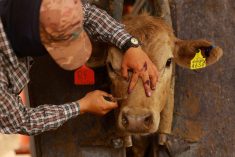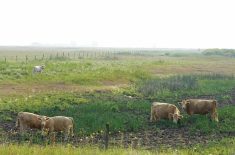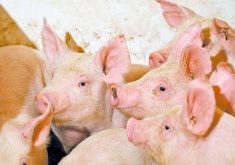Identify your resources and review your plan, says an expert in emergency planning for livestock.
The COVID-19 pandemic is a very different type of emergency, said Rebecca Husted, a teacher of technical large animal emergency rescue.
“Most disasters like fires and floods have people moving around, but in COVID-19, people are not supposed to move around,” Husted said Thursday at Alberta Farm Animal Care’s Livestock Care Conference.
(The conference was to be held in Olds, Alta. on Wednesday and Thursday but was changed to an online event, with social distancing in mind.)
Read Also

U.S. not ready to lift Mexican cattle ban over screwworm, Agriculture Secretary Rollins says
The U.S. is not yet ready to reopen its border to Mexican cattle amid an outbreak of the flesh-eating New World screwworm parasite, Agriculture Secretary Brooke Rollins said, but she is pleased with Mexico’s efforts to contain the pest.
But planning ahead — even in a fast-changing situation — remains key. This should involve being in touch with government or agencies (such as ag services boards or farm groups) and making them aware of your situation.
“It comes down to us, in our communities, raising the flag and going to those folks ahead of time and saying, ‘Hey, you have to come up with some plans because it makes your job as an emergency manager a lot easier if you already have a plan with your livestock producers or (agriculture) industry in the area,'” she said.
Canada and the U.S. use “all-hazards disaster plans,” which include plans for evacuation as well as plans for sheltering in place, said Husted.
“This is a shelter-in-place disaster as much as possible, but there’s some things we need to be able to move,” she said. “We need to be able to move our animals and products.”
Disaster managers in your community will be overtaxed and likely won’t have any plans for livestock.
“They have no idea what to do when it comes to transportation of ag products, and you may want to give them some expertise in your local community,” she said.
And prepare for the worst.
“Think about what you have to do if you can’t move your animals,” she said. “For some producers, you have to think about what your euthanasia plan is. If you can’t get the veterinarian there to deal with your horse with a broken leg, what are you going to do? If you, for whatever reason, can’t sell your pigs and they get too old and they aren’t marketable, what are you going to do with them?”
Anyone who is taking care of someone else’s animals might want to get a waiver that says that they can make decisions on the owner’s behalf.
Be prepared for some bottlenecks and slowdowns in the supply chain.
“Supply chains are going to be affected,” said Husted. “Veterinary associations are suggesting that some pharmaceutical products could be in short supply. It may be that some of that stuff is produced in China.”
Think about staffing requirements, and steps will need to be taken if staff get sick or need to take time off to deal with sick relatives or take care of children. As well, many people in the agricultural community are older, and therefore more likely to be seriously ill.
Also make a list of contacts — including “all those folks who are essential to your business, from your employees to your suppliers.”
Many people in the agricultural community are older, and therefore more likely to be seriously ill. It’s also important to make sure the business can run if people get sick or injured — including yourself.
“You need to think, ‘If I wasn’t coming back, what would people need to know so they could run the farm?'”
The thought of planning for so many dire possibilities can be disheartening, but Husted urged her audience to persevere.
“There are people who are very successful going through a disaster, but they have a plan, and they are prepared and as soon as the market is ready, they are going to move on that.”
— Alexis Kienlen reports for Alberta Farmer from Edmonton.













